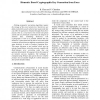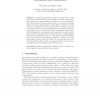1834 search results - page 128 / 367 » Public Key Cryptography |
ACNS
2004
Springer
15 years 4 months ago
2004
Springer
Cryptographic protocol design in a two-party setting has often ignored the possibility of simultaneous message transmission by each of the two parties (i.e., using a duplex channe...
115
click to vote
DICTA
2007
15 years 23 days ago
2007
Existing asymmetric encryption algorithms require the storage of the secret private key. Stored keys are often protected by poorly selected user passwords that can either be guess...
102
click to vote
EUROCRYPT
2009
Springer
15 years 12 months ago
2009
Springer
We consider information-theoretic key agreement between two parties sharing somewhat different versions of a secret w that has relatively little entropy. Such key agreement, also ...
STOC
2005
ACM
15 years 11 months ago
2005
ACM
Assume that Alice and Bob, given an authentic channel, have a protocol where they end up with a bit SA and SB, respectively, such that with probability 1+ 2 these bits are equal. ...
EUROCRYPT
2004
Springer
15 years 4 months ago
2004
Springer
Generating a distributed key, where a constant fraction of the players can reconstruct the key, is an essential component of many largescale distributed computing tasks such as ful...


